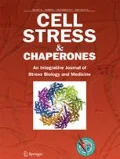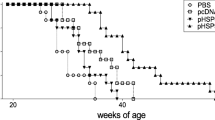Abstract
Developing immunosuppressive therapies for autoimmune diseases comes with a caveat that immunosuppression may promote the risk of developing other conditions or diseases. We have previously shown that biolistic delivery of an expression construct encoding inducible HSP70 (HSP70i) with one amino acid modification in the dendritic cell (DC) activating moiety 435–445 (HSP70iQ435A) to mouse skin resulted in significant immunosuppressive activity of autoimmune vitiligo, associated with fewer tissue infiltrating T cells. To prepare HSP70iQ435A as a potential therapeutic for autoimmune vitiligo, in this study we evaluated whether and how biolistic delivery of HSP70iQ435A in mice affects anti-tumor responses. We found that HSP70iQ435A in fact supports anti-tumor responses in melanoma-challenged C57BL/6 mice. Biolistic delivery of the HSP70iQ435A-encoding construct to mice elicited significant anti-HSP70 titers, and anti-HSP70 IgG and IgM antibodies recognize surface-expressed and cytoplasmic HSP70i in human and mouse melanoma cells. A peptide scan revealed that the anti-HSP70 antibodies recognize a specific C-terminal motif within the HSP70i protein. The antibodies elicited surface CD107A expression among mouse NK cells, representative of antibody-mediated cellular cytotoxicity (ADCC), supporting the concept, that HSP70iQ435A-encoding DNA elicits a humoral response to the stress protein expressed selectively on the surface of melanoma cells. Thus, besides limiting autoimmunity and inflammation, HSP70iQ435A elicits humoral responses that limit tumor growth and may be used in conjunction with immune checkpoint inhibitors to not only control tumor but to also limit adverse events following tumor immunotherapy.







Similar content being viewed by others
References
Albakova Z, Armeev GA, Kanevskiy LM, Kovalenko EI, Sapozhnikov AM (2020) HSP70 multi-functionality in cancer. Cells 9 (3)
Albus U (2012) Guide for the care and use of laboratory animals (8th edn). Laboratory Animals 46(3):267–268. https://doi.org/10.1258/la.2012.150312
Alter G, Malenfant JM, Altfeld M (2004) CD107a as a functional marker for the identification of natural killer cell activity. J Immunol Methods 294(1–2):15–22. https://doi.org/10.1016/j.jim.2004.08.008
Asea A (2005) Stress proteins and initiation of immune response: chaperokine activity of hsp72. Exerc Immunol Rev 11:34–45
Association WM (2013) World Medical Association Declaration of Helsinki: ethical principles for medical research involving human subjects. JAMA 310(20):2191–2194. https://doi.org/10.1001/jama.2013.281053
Audiger C, Rahman MJ, Yun TJ, Tarbell KV, Lesage S (2017) The importance of dendritic cells in maintaining immune tolerance. J Immunol 198(6):2223–2231. https://doi.org/10.4049/jimmunol.1601629
Barnes JA, Dix DJ, Collins BW, Luft C, Allen JW (2001) Expression of inducible Hsp70 enhances the proliferation of MCF-7 breast cancer cells and protects against the cytotoxic effects of hyperthermia. Cell Stress Chaperones 6(4):316–325
Beckmann R, Mizzen L, Welch W (1990) Interaction of Hsp 70 with newly synthesized proteins: implications for protein folding and assembly. Science 248:850–854
Bedogni B, Powell MB (2009) Hypoxia, melanocytes and melanoma - survival and tumor development in the permissive microenvironment of the skin. Pigment Cell Melanoma Res 22(2):166–174
Beere HM (2004) ‘The stress of dying’: the role of heat shock proteins in the regulation of apoptosis. J Cell Sci 117(13):2641. https://doi.org/10.1242/jcs.01284
Belum VR, Benhuri B, Postow MA, Hellmann MD, Lesokhin AM, Segal NH, Motzer RJ, Wu S, Busam KJ, Wolchok JD, Lacouture ME (2016) Characterisation and management of dermatologic adverse events to agents targeting the PD-1 receptor. Eur J Cancer 60:12–25. https://doi.org/10.1016/j.ejca.2016.02.010
Bisevac JP, Djukic M, Stanojevic I, Stevanovic I, Mijuskovic Z, Djuric A, Gobeljic B, Banovic T, Vojvodic D (2018) Association between oxidative stress and melanoma progression. J Med Biochem 37(1):12–20
Boniface K, Jacquemin C, Darrigade A-S, Dessarthe B, Martins C, Boukhedouni N, Vernisse C, Grasseau A, Thiolat D, Rambert J, Lucchese F, Bertolotti A, Ezzedine K, Taieb A, Seneschal J (2018) Vitiligo skin is imprinted with resident memory CD8 T cells expressing CXCR3. J Investig Dermatol 138(2):355–364. https://doi.org/10.1016/j.jid.2017.08.038
Botzler C, Li G, Issels RD, Multhoff G (1998) Definition of extracellular localized epitopes of Hsp70 involved in an NK immune response. Cell Stress Chaperones 3(1):6–11. https://doi.org/10.1379/1466-1268(1998)003%3c0006:doeleo%3e2.3.co;2
Bruhns P, Jönsson F (2015) Mouse and human FcR effector functions. Immunol Rev 268(1):25–51. https://doi.org/10.1111/imr.12350
Budina-Kolomets A, Webster MR, Leu JI, Jennis M, Krepler C, Guerrini A, Kossenkov AV, Xu W, Karakousis G, Schuchter L, Amaravadi RK, Wu H, Yin X, Liu Q, Lu Y, Mills GB, Xu X, George DL, Weeraratna AT, Murphy ME (2016) HSP70 inhibition limits FAK-dependent invasion and enhances the response to melanoma treatment with BRAF inhibitors. Cancer Res 76(9):2720–2730
Chen T, Guo J, Han C, Yang M, Cao X (2009) Heat shock protein 70, released from heat-stressed tumor cells, initiates antitumor immunity by inducing tumor cell chemokine production and activating dendritic cells via TLR4 pathway. J Immunol 182(3):1449–1459. https://doi.org/10.4049/jimmunol.182.3.1449
Chlipala EA, Bendzinski CM, Dorner C, Sartan R, Copeland K, Pearce R, Doherty F, Bolon B (2020) An image analysis solution for quantification and determination of immunohistochemistry staining reproducibility. Appl Immunohistochem Mol Morphol 28(6):428–436
Clark PR, Ménoret A (2001) The inducible Hsp70 as a marker of tumor immunogenicity. Cell Stress Chaperones 6(2):121–125
Denman CJ, McCracken J, Hariharan V, Klarquist J, Oyarbide-Valencia K, Guevara-Patiño JA, Le Poole IC (2008) HSP70i accelerates depigmentation in a mouse model of autoimmune vitiligo. J Invest Dermatol 128(8):2041–2048
Domogalla MP, Rostan PV, Raker VK, Steinbrink K (2017) Tolerance through education: how tolerogenic dendritic cells shape immunity. Frontiers in Immunology 8 (1764). https://doi.org/10.3389/fimmu.2017.01764
Guevara-Patiño JA, Engelhorn ME, Turk MJ, Liu C, Duan F, Rizzuto G, Cohen AD, Merghoub T, Wolchok JD, Houghton AN (2006) Optimization of a self antigen for presentation of multiple epitopes in cancer immunity. J Clin Invest 116(5):1382–1390. https://doi.org/10.1172/jci25591
Henning SW, Fernandez MF, Mahon JP, Duff R, Azarafrooz F, Guevara-Patiño JA, Rademaker AW, Salzman AL, Le Poole IC (2018) HSP70i(Q435A)-encoding DNA repigments vitiligo lesions in sinclair swine. J Invest Dermatol 138(12):2531–2539. https://doi.org/10.1016/j.jid.2018.06.186
Hua C, Boussemart L, Mateus C, Routier E, Boutros C, Cazenave H, Viollet R, Thomas M, Roy S, Benannoune N, Tomasic G, Soria JC, Champiat S, Texier M, Lanoy E, Robert C (2016) Association of vitiligo with tumor response in patients with metastatic melanoma treated with pembrolizumab. JAMA Dermatol 152(1):45–51. https://doi.org/10.1001/jamadermatol.2015.2707
Iberg CA, Hawiger D (2020) Natural and induced tolerogenic dendritic cells. J Immunol 204:733–744
Jäättelä M (1999) Heat shock proteins as cellular lifeguards. Ann Med 31(4):261–271. https://doi.org/10.3109/07853899908995889
Kasioumi P, Vrazeli P, Vezyraki P, Zerikiotis S, Katsouras C, Damalas A, Angelidis C (2019) Hsp70 (HSP70A1A) downregulation enhances the metastatic ability of cancer cells. Int J Oncol 54(3):821–832
Katschinski DM (2004) On heat and cells and proteins. Physiology 19(1):11–15. https://doi.org/10.1152/nips.01403.2002
Kim MY, Oglesbee M (2012) Virus-heat shock protein interaction and a novel axis for innate antiviral immunity. Cells 1(3):646–666
Lazaris AC, Theodoropoulos GE, Aroni K, Saetta A, Davaris PS (1995) Immunohistochemical expression of C-myc oncogene, heat shock protein 70 and HLA-DR molecules in malignant cutaneous melanoma. Virchows Arch 426(5):461–467. https://doi.org/10.1007/BF00193169
Mambula SS, Stevenson MA, Ogawa K, Calderwood SK (2007) Mechanisms for Hsp70 secretion: crossing membranes without a leader. Methods 43(3):168–175. https://doi.org/10.1016/j.ymeth.2007.06.009
Mansilla MJ, Costa C, Eixarch H, Tepavcevic V, Castillo M, Martin R, Lubetzki C, Aigrot MS, Montalban X, Espejo C (2014) Hsp70 regulates immune response in experimental autoimmune encephalomyelitis. PLoS One 9 (8):e105737
Mansilla MJ, Montalban X, Espejo C (2012) Heat shock protein 70: roles in multiple sclerosis. Mol Med 18(1):1018–1028
Menares E, Gálvez-Cancino F, Cáceres-Morgado P, Ghorani E, López E, Díaz X, Saavedra-Almarza J, Figueroa DA, Roa E, Quezada SA, Lladser A (2019) Tissue-resident memory CD8+ T cells amplify anti-tumor immunity by triggering antigen spreading through dendritic cells. Nat Commun 10(1):4401. https://doi.org/10.1038/s41467-019-12319-x
Morgan CD, Measel JW, Amoss MS, Rao A, Greene JF (1996) Immunophenotypic characterization of tumor infiltrating lymphocytes and peripheral blood lymphocytes isolated from melanomatous and non-melanomatous Sinclair miniature swine. Vet Immunol Immunopathol 55(1):189–203. https://doi.org/10.1016/S0165-2427(96)05621-8
Morrison BJ, Roman JA, Luke TC, Nagabhushana N, Raviprakash K, Williams M, Sun P (2017) Antibody-dependent NK cell degranulation as a marker for assessing antibody-dependent cytotoxicity against pandemic 2009 influenza A(H1N1) infection in human plasma and influenza-vaccinated transchromosomic bovine intravenous immunoglobulin therapy. J Virol Methods 248:7–18. https://doi.org/10.1016/j.jviromet.2017.06.007
Mosenson JA, Zloza A, Klarquist J, Barfuss AJ, Guevara-Patino JA, Poole IC (2012) HSP70i is a critical component of the immune response leading to vitiligo. Pigment Cell Melanoma Res 25(1):88–98
Mosenson JA, Zloza A, Nieland JD, Garrett-Mayer E, Eby JM, Huelsmann EJ, Kumar P, Denman CJ, Lacek AT, Kohlhapp FJ, Alamiri A, Hughes T, Bines SD, Kaufman HL, Overbeck A, Mehrotra S, Hernandez C, Nishimura MI, Guevara-Patino JA, Le Poole IC (2013) Mutant HSP70 reverses autoimmune depigmentation in vitiligo. Sci Transl Med 5 (174):174ra128
Multhoff G, Pfister K, Gehrmann M, Hantschel M, Gross C, Hafner M, Hiddemann W (2001) A 14-mer Hsp70 peptide stimulates natural killer (NK) cell activity. Cell Stress Chaperones 6(4):337–344. https://doi.org/10.1379/1466-1268(2001)006%3c0337:AMHPSN%3e2.0.CO;2
Naidoo J, Page DB, Li BT, Connell LC, Schindler K, Lacouture ME, Postow MA, Wolchok JD (2015) Toxicities of the anti-PD-1 and anti-PD-L1 immune checkpoint antibodies. Ann Oncol 26(12):2375–2391
Nimmervoll B, Chtcheglova LA, Juhasz K, Cremades N, Aprile FA, Sonnleitner A, Hinterdorfer P, Vigh L, Preiner J, Balogi Z (2015) Cell surface localised Hsp70 is a cancer specific regulator of clathrin-independent endocytosis. FEBS Letters 589(19PartB):2747–2753. https://doi.org/10.1016/j.febslet.2015.07.037
Noessner E, Gastpar R, Milani V, Brandl A, Hutzler PJ, Kuppner MC, Roos M, Kremmer E, Asea A, Calderwood SK, Issels RD (2002) Tumor-derived heat shock protein 70 peptide complexes are cross-presented by human dendritic cells. J Immunol 169(10):5424–5432. https://doi.org/10.4049/jimmunol.169.10.5424
Park SL, Buzzai A, Rautela J, Hor JL, Hochheiser K, Effern M, McBain N, Wagner T, Edwards J, McConville R, Wilmott JS, Scolyer RA, Tüting T, Palendira U, Gyorki D, Mueller SN, Huntington ND, Bedoui S, Hölzel M, Mackay LK, Waithman J, Gebhardt T (2019) Tissue-resident memory CD8+ T cells promote melanoma–immune equilibrium in skin. Nature 565(7739):366–371. https://doi.org/10.1038/s41586-018-0812-9
Schneider CA, Rasband WS, Eliceiri KW (2012) NIH Image to ImageJ: 25 years of image analysis. Nat Methods 9(7):671–675. https://doi.org/10.1038/nmeth.2089
Sherman MY, Gabai VL (2015) Hsp70 in cancer: back to the future. Oncogene 34(32):4153–4161. https://doi.org/10.1038/onc.2014.349
Shevtsov M, Huile G, Multhoff G (2018) Membrane heat shock protein 70: a theranostic target for cancer therapy. Philosophical Transactions of the Royal Society b: Biological Sciences 373(1738):20160526. https://doi.org/10.1098/rstb.2016.0526
Spiers L, Coupe N, Payne M (2019) Toxicities associated with checkpoint inhibitors-an overview. Rheumatology (Oxford) 58(Suppl 7):vii7–vii16
Stangl S, Gehrmann M, Riegger J, Kuhs K, Riederer I, Sievert W, Hube K, Mocikat R, Dressel R, Kremmer E, Pockley AG, Friedrich L, Vigh L, Skerra A, Multhoff G (2011) Targeting membrane heat-shock protein 70 (Hsp70) on tumors by cmHsp70.1 antibody. Proc Natl Acad Sci 108:733–738
Stewart R, Hammond SA, Oberst M, Wilkinson RW (2014) The role of Fc gamma receptors in the activity of immunomodulatory antibodies for cancer. J Immunother Cancer 2(1):29. https://doi.org/10.1186/s40425-014-0029-x
Udono H, Srivastava PK (1993) Heat shock protein 70-associated peptides elicit specific cancer immunity. J Exp Med 178(4):1391–1396
Wang J, Perry CJ, Meeth K, Thakral D, Damsky W, Micevic G, Kaech S, Blenman K, Bosenberg M (2017) UV-induced somatic mutations elicit a functional T cell response in the YUMMER1.7 mouse melanoma model. Pigment Cell Melanoma Res 30 (4):428–435. https://doi.org/10.1111/pcmr.12591
Witt SN (2010) Hsp70 molecular chaperones and Parkinson’s disease. Biopolymers 93(3):218–228. https://doi.org/10.1002/bip.21302
Yang N-S, Sun WH, McCabe D (1996) Developing particle-mediated gene-transfer technology for research into gene therapy of cancer. Mol Med Today 2(11):476–481. https://doi.org/10.1016/1357-4310(96)10046-0
Young RA (1990) Stress proteins and immunology. Annu Rev Immunol 8:401–420. https://doi.org/10.1146/annurev.iy.08.040190.002153
Zhang L, Huang Y, Lindstrom AR, Lin TY, Lam KS, Li Y (2019) Peptide-Based Materials for Cancer Immunotherapy. Theranostics 9(25):7807–7825. https://doi.org/10.7150/thno.37194
Funding
These studies were supported by the National Institutes of Health (NIH)/National Cancer Institute (NCI) 1R01CA191317 awarded to CLP.
Author information
Authors and Affiliations
Corresponding authors
Additional information
Publisher's Note
Springer Nature remains neutral with regard to jurisdictional claims in published maps and institutional affiliations.
Supplementary Information
Below is the link to the electronic supplementary material.
Rights and permissions
About this article
Cite this article
Jaishankar, D., Cosgrove, C., Ramesh, P. et al. HSP70iQ435A to subdue autoimmunity and support anti-tumor responses. Cell Stress and Chaperones 26, 845–857 (2021). https://doi.org/10.1007/s12192-021-01229-x
Received:
Revised:
Accepted:
Published:
Issue Date:
DOI: https://doi.org/10.1007/s12192-021-01229-x




